US, Israel Hold Strategic Meeting On Countering Iran Threat
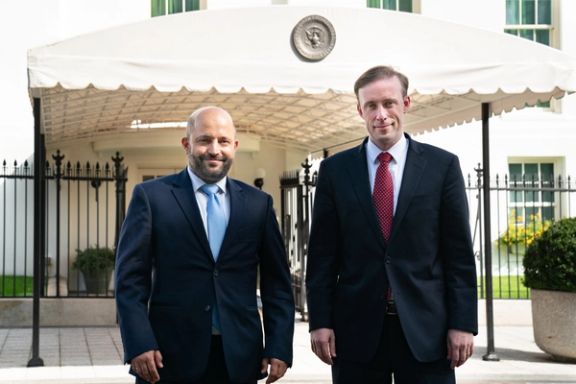
US National Security Advisor Jake Sullivan and his Israeli counterpart Eyal Hulata held a discussion Thursday over Islamic Republic growing’s military cooperation with Russia.

US National Security Advisor Jake Sullivan and his Israeli counterpart Eyal Hulata held a discussion Thursday over Islamic Republic growing’s military cooperation with Russia.
Senior representatives from foreign policy, defense, and intelligence agencies also took part in the virtual meeting of the US-Israel Strategic Consultative Group (SCG). The national security chiefs and their aides reviewed Islamic Republic’s growing military relationship with Russia, including the transfer of weapons the Kremlin is deploying against Ukraine, targeting its civilian infrastructure, and Russia’s provision of military technology to Iran in return.
The officials also expressed commitment to countering Iran’s threats in the region, and to ensuring that Tehran can never acquire a nuclear weapon.
According to a read out of the meeting released by the White House, they also discussed the broad array of economic sanctions imposed in recent months against Iran, reviewed ongoing cooperation and exercises between the US military and Israel Defense Forces, and assessed means for enhancing Israel’s security and economic integration throughout the Middle East region.
British defense minister Ben Wallace also said on Tuesday that Russia was planning to give Iran advanced military components in exchange for hundreds of drones. "Iran has become one of Russia's top military backers," Wallace said.
The West is particularly concerned over the possibility of Iran supplying missiles to Russia, as Moscow’s stockpiles dwindle.
Russian Energy Minister Nikolai Shulginov said in a statement on Tuesday that Russian companies are interested in cooperating with Iran on gas turbine technology and joint production. Russia has been trying to start producing its own gas turbines of medium or large capacity for years, but is yet to fine tune the process.
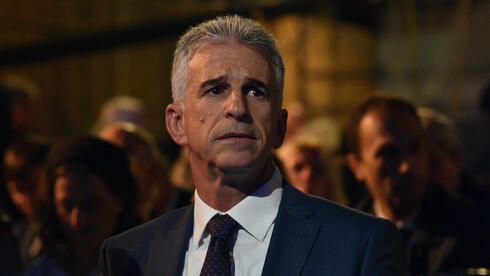
Iran is preparing more weapons deliveries to Russia and is trying to mislead the world on arming its ally, head of Israel’s Mossad, David Barnea said Thursday.
In a speech to his agency’s employees, Barnea warned about Tehran’s intentions, underlining that the Islamic Republic continues daily cyber-attacks and other machinations against Israel. He added that Mossad is ““still warning about Iran’s future and intentions, which it is trying to keep secret.”
The spy chief also called the Obama-era nuclear deal with Iran known as the JCPOA an “absurd” agreement taking aim at the United States and its European allies who have been negotiating with Tehran to revive the accord since early 2021.
The diplomatic effort has come to an impasse as Iran is ramping up uranium enrichment but the Biden Administration and the European Union still say that diplomacy is the best option to limit Iran’s nuclear program.
“We are warning about Iran’s intention to expand its uranium enrichment program, and its intention to increase its influence over friendly Muslim countries in the region in various ways,” he said, vowing never to allow the Iran’s clerical regime to obtain nuclear weapons.
He also praised the Iranian protest movement, saying hundreds have been killed in the streets, calling it “unrestrained brutality” by regime forces.
Barnea claimed that Israel provided intelligence to its Western allies earlier in the year about Iran’s plans to provide killer drones to Russia to be used against Ukraine and insisted that Tehran is preparing more weapons deliveries to Moscow.

A conservative politician and former lawmaker has accused hardliners of pursuing policies that have increasingly isolated Iran in the international community.
Mansoor Haqiqatpur told Didban Iran website that hardliners who insist on radical approaches hold key positions in the government. Although he did not name any politician, most members of Iran’s parliament and the presidential administration are hardliners, many coming from the Revolutionary Guard.
"They are the same politicians who advocated the attack on the Saudi embassy [in 2016], attacked Ali Larijani [during a speech in Qom in 2012] and insulted Ayatollah Ruhollah Khomeini's grandson Hassan Khomeini in front of foreign guests[ in June 2022],” Haqiqatpur, who is close to former parliament speaker Larijani, said.
Ali Larijani was pushed out of the political spotlight after the 2020 parliamentary elections engineered to hand an absolute majority to hardliners, but he is considered a leader for traditional conservatives as opposed to ultra-conservatives currently in power.
Larijani’s ally further charged that while the revised edition of the 2015 nuclear deal with world powers was ready for final approval by all the parties involved, the hardliners prevented the outgoing Rouhani administration from signing it in mid-2021.
Haqiqatpur added that hardliners constantly impose their ideas on the government, but he claimed their positions are not in line with the regime's general policies.
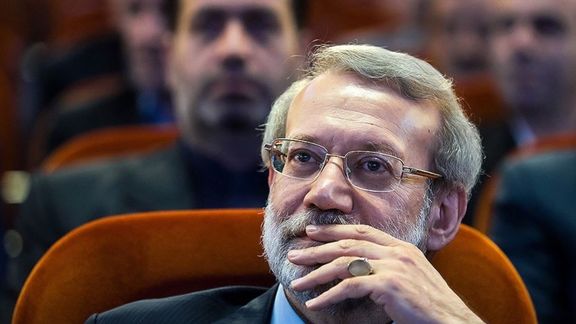
This kind of comment aimed at distancing the Iranian government from the actions of radicals that harm Tehran’s ties with the world have been made by several politicians during the past weeks. However, no one has explained why and how hardliners can impose their views on the government if they are not supported by Supreme Leader Ali Khamenei who has the final say about everything in Iran and micromanages every single move in Iran's domestic and international politics.
But not mentioning Khamenei's role is understandable because that would probably mean big trouble for whoever criticizes him and no media in Tehran would publish such an interview.
Haqiqatpur stressed that Iranians are experiencing hardships because Iran has severed its ties with the rest of the world. He reiterated that Iran should maintain ties with all countries, in particular with the United States and the United Kingdom, except Israel.
In domestic politics, he said, the hardliners talk about compulsory hijab in a bad language. He was probably referring to IRGC Qods Force Commander Esmail Qaani who insulted Iranian women during a December 20 angry speech. He advised that such officials should watch their mouth and control their behavior.
Some of Iranian media such as the Kayhan newspaper that operates under the supervision of Khamenei are known for badmouthing prominent individuals. Recently, the Kayhan and its editor Hossein Shariatmadari have been widely criticized for their ruthless attack on Ayatollah Mostafa Mohaqeq Damad who had called for stopping the execution of Iranian protesters.
After the news of cleric's views and his brave letter to the Revolutionary Court judges were picked up by international media, the Kayhan accused him of catering to the needs of Western propaganda against Iran.
Shariatmadari also tried to defend Iran's President Raisi who has been largely ignored by both the media and the people during the Iran protests. The hardliner editor praised him for his baseless bragging about Iran's progress during his presidency, which is otherwise seen by many as a complete failure.
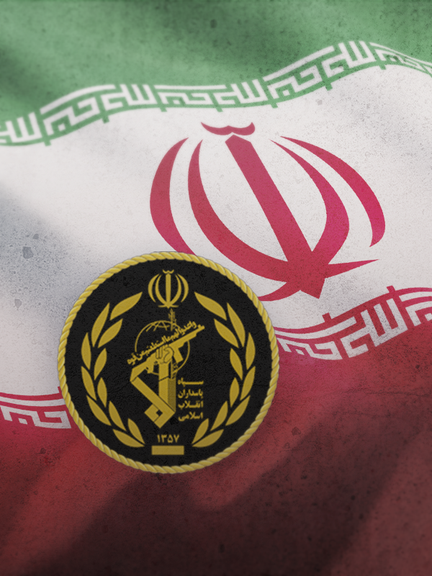
The Dutch Parliament on Thursday passed a motion that urges the government to support EU's proscription of IRGC as a terrorist organization, considering the repression of protesters and supply of drones to Russia.
The motion was introduced to designate Iran’s Revolutionary Guard (IRGC) as a terrorist group both at the national and European level.
Don Ceder, Member of House of Representatives of Netherland told Iran international that putting pressure on the regime in Iran is necessary to make sure it upholds all the human rights of the people.
“We have proposed many sanctions in many ways on a national level, also on a European level, because we feel that we are in solidarity with the people of Iran,” he added.
He said Dutch parliamentarians are calling upon the Iranian government to uphold the human rights path policies and ensure that people have the freedom to demonstrate and to stop any planned executions.
“I have submitted a motion to even regard the IRGC as a terrorist group. So, this is something we are talking about in the parliament to see if it gets a majority. We are really advocating sanctions on a national level, but also at the European level,” he noted.
Earlier this month, the EU designated 20 people and Iran’s state media over reported human rights abuses, along with eight people or entities over sending drones to Russia.
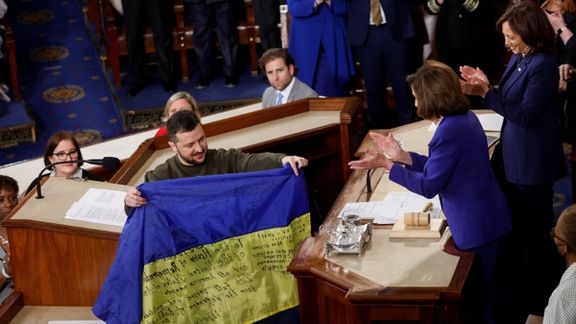
Iran has rejected charges made by Ukrainian President Volodymyr Zelenskyy in his speech to the United States Congress Wednesday.
Foreign affairs spokesman Nasser Kanaani said Thursday Zelenskyy had made “baseless accusations” over Iran’s supply of military to drones to Russia. Kanaani reiterated Tehran’s contention it had not “issued any military equipment to any side for use in the war in Ukraine.”
Iran said in November that any its Shahed-136 drones – which employ many easily-bought US components – used by Russia had been sent before the current wave of hostilities began in February - which does not preclude their use in the war.
Kanaani charged that Zelenskyy had exploited the issue “with the hope of strengthening Ukraine’s defensive power and American support for the war.” In his emotional address, after which he handed House Speaker Nancy Pelosi a Ukrainian flag signed by troops defending the city of Bakhmut, Zelenskyy asked for more arms and more sanctions against Russia.
At the White House, President Joe Biden promised to “keep the flame of liberty burning bright” and pledged an extra $1.85 billion in weapons, on top of the current $20 billion, while Congress prepared to vote another $45 billion in overall aid.
In his Congressional address, Zelenskyy presented Iran as “an ally [of Russia]…in this genocidal policy” and a “terrorist.” Responding, Kanaani said Tehran had “always respected the territorial integrity of countries, including Ukraine.” Earlier this week, Foreign Minister Hossein Amir-Abdollahian told the Third Tehran Dialogue Forum that Iran wanted the conflict resolved through dialogue “taking into account the legitimate security concerns of the parties.”
Back in July, when Russian President Vladimir Putin visited Tehran, Iranian Leader Ali Khamenei blamed the West, suggesting war had resulted, at least in part, from Nato failing to “recognize any limits or borders.” Citing the 2014 Ukraine “coup” – protests that removed Moscow-inclined President Viktor Yanukovich and prompted Russia’s seizure of Crimea – and Nato’s expansion to 14 eastern European countries since 1999, Khamenei said the “dangerous creature” of Nato, if not faced down, “would have started this war anyway.”
But what clearly showed that Khamenei supports Russia’s attack on Ukraine was his praise for Putin to have taken the “initiative” against Ukraine.
Although most of the drones have been easily shot down and US spokesman Ned Price has conceded their role as small, some analysts suggest the real US fear is Tehran replenishing Moscow’s missile stocks, which the US hopes to run down as the war continues.
US: Russia ‘illegally’ using Iranian, North Korean weapons
The US Thursday kept up denunciation of Russia-Iran links. In a statement Washington’s ambassador to the United Nations Linda Thomas-Greenfield said Russia was “illegally” using weapons from both Iran and North Korea in its “Brutal War [sic] Against Ukraine.” Thomas-Greenfield called this a “violation of UN Security Council resolutions.”
She was apparently referring to North Korea’s launching ballistic missiles this year, which she said implicated Russia as a “partner to such behavior.” The illegality of acquiring Iranian military drones, she suggested, arose from “violations of UN Security Council Resolution 2231,” which in 2015 endorsed the Iran nuclear agreement, the JCPOA (Joint Comprehensive Plan of Action). The US left the JCPOA in 2018 but along with France, Germany, and the United Kingdom now evokes the resolution in claiming the drones supply violates one of 2231’s clauses – a claim Tehran and Russia reject.
Israeli officials, meanwhile, cited in Haaretz newspaper Thursday, said Iran could use technology from its space program to launch nuclear weapons. These officials, the paper continued, “say that two of the rockets Iran has developed for launching satellites into orbit – the Zoljanah and the QAEM-100 – have similar capabilities [to those of ballistic missiles], including engines and fuel tanks that can accommodate solid fuel.”
Reporting that “building an intercontinental ballistic missile with such a range [over 4,000 km] is one of Iran’s strategic goals,” Haaretz informed readers this would “add Europe to the list of countries threatened by Iran’s weapons, whether conventional or nuclear.”
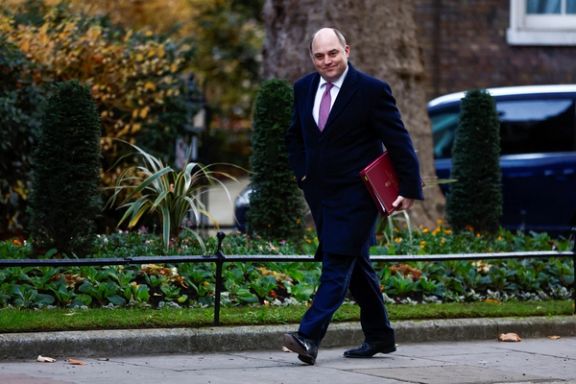
The United Kingdom has warned that Moscow is to provide Tehran with some advanced military technology that will put the security of the Middle East and world in danger.
Britain’s Defense Secretary Ben Wallace told parliament Tuesday that in return for Iranian drones it uses in attacks on Ukraine, Russia will supply the military components to the Islamic Republic.
Wallace told the parliamentarians that Iran should be held accountable for supporting Russia in war on Ukraine.
“We must hold their enablers to account,” he noted. “Iran has become one of Russia’s top military backers. In return for having supplied more than 300 kamikaze drones, Russia intends to provide it with advanced military components, undermining both Middle East and international security. We must expose this deal.”
However, Wallace did not reveal more details about the technology that Tehran is going to receive.
Reuters says the Russian Defense Ministry and Iran’s foreign ministry have refused to give a comment regarding Wallace’s statements.
Earlier, Washington said Moscow was moving to provide Tehran with advanced military assistance including air defense systems, choppers, and fighter jets.
Russia was offering the Islamic Republic “an unprecedented level of military and technical support that is transforming their relationship into a full-fledged defense partnership,” said White House National Security Council spokesman John Kirby on December 9.
The Biden administration recently unveiled sanctions against Iranian firms and entities involved in the transfer of drones to Russia for use in Ukraine.